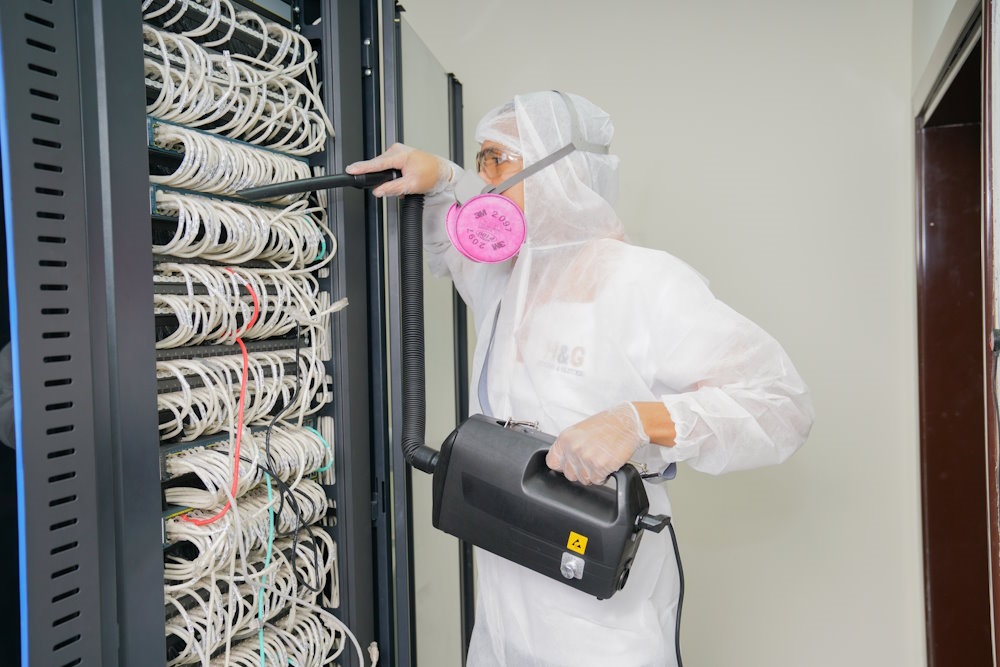Growth in facilities is driving demand for specialist cleaning service providers that adhere to international standards & guidelines, says Hitches & Glitches
Dubai-based sustainable and technology-driven maintenance and cleaning specialist Hitches & Glitches (H&G), part of the Farnek Group, has noticed a significant uptick in demand for specialised cleaning, for the UAE’s growing data centre market.
According to premier global market research and consulting organisation, Blackridge, the data centre market in the UAE is projected to experience a compound annual growth rate of 9.95% over the next five years, creating a market worth AED 9.7 billion by 2029.
Underscoring this estimate, the UAE government’s strategy to expand its digital economy has borne fruit by persuading multinational technology companies such as Amazon Web Services (AWS), Google, Microsoft and Alibaba to expand their capacity throughout the country.
Consequently, the UAE now has 38 data centre facilities primarily located in Abu Dhabi and Dubai, with companies such as Equinix Inc., Khazna Data Center and Moro Hub, leading the way.
“Data centre equipment is highly sensitive and optimal performance is critical to their success. The equipment consists of switches, routers, hubs, UPS batteries and racks which collect dust & debris like any other object. However, the cleaning process is extremely sophisticated and technical,” said Zohaib Azhar, director of operations at Hitches & Glitches.
“Therefore, maintaining the reliability, efficiency, and safety of these high-value assets is of paramount importance. There are international standards for controlled environments, such as the ISO 14644-1 Class 8 standard, which need to be adhered to regularly carried out by a highly trained, certified team of data centre cleaning technicians,” he added.
ASHRAE (American Society of Heating, Refrigerating and Air-Conditioning Engineers) TC 9.9 standards also provide guidelines, which focus on mission-critical facilities such as data centres, to optimise environmental control, protect equipment and ensure reliability.
The guidelines include maintaining clean air by minimising gaseous contaminants and airborne particulates, which can damage sensitive electronic equipment. They suggest regular monitoring and setting limits on particulate levels, with an emphasis on controlling dust and debris, as well as adhering to specific cleanliness levels.
ASHRAE recommends specific methods for cleaning, such as using anti-static cleaning products and vacuuming with HEPA (High-Efficiency Particulate Air) filters to prevent dust from spreading. They also provide guidance on how frequently cleaning should be conducted, depending on the type of equipment and environmental conditions.
The layout and airflow design of a data centre are also critical. ASHRAE guidelines address proper airflow which reduces dust accumulation and ensures contaminants are effectively managed. Cleaning procedures should consider air flow patterns to avoid recirculating dust during routine maintenance.
“These guidelines help data centres maintain a clean and controlled environment, ensuring optimal performance and equipment longevity. Compliance with ASHRAE standards is often required for facilities to maintain high operational reliability and efficiency.
“Considering the significant level of investment, data centre management must ensure compliance with international standards to mitigate the chance of a serious outage, or significant downtime.
“To achieve that consistency, it is imperative that cleaning teams are not only fully trained but hold specialist certifications. Due to our expertise, H&G is a preferred by prominent data centre management companies such as SecureTech and ITQAN, amongst others,” added Azhar.
Although not directly related to physical cleaning, ASHRAE standards also stress the importance of maintaining proper temperature and humidity levels to avoid static discharge and corrosion, which can be exacerbated by dust and dirt buildup.

